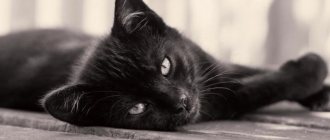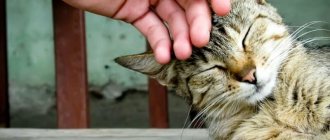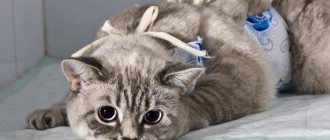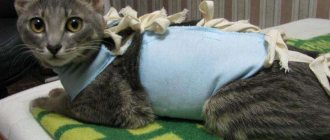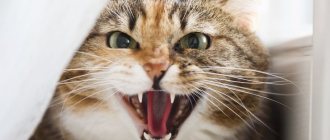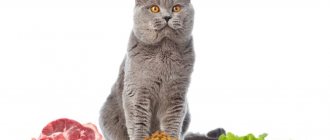Cats are one of the most mysterious animals on the planet. They often behave completely unpredictably - many owners have noticed that their pets bury food.
Let's find out in what cases this is the norm, and whether it is possible to wean your pet from this habit.
Mr. Cat recommends: the main reasons for burying food
Experts identify several possible reasons why a cat may bury food. Among them:
- excess food (the cat tries to hide food or hide traces of its presence, obeying instinct);
- inadequate quality or unsatisfactory organoleptic characteristics of food for a particular animal (a cat may not like the taste or smell of food, on the basis of which it concludes that it is not suitable for it; this may be due to both the animal’s own preferences and the fact that the product is spoiled) ;
- foreign smell, dissatisfaction with the feeding utensil itself or its poor location;
- dirt in the feeding area (if the area under the bowl is not cleaned, and the dishes themselves are not washed for a long time, the cat will try to remove disgusting, from her point of view, odors using her own methods);
- lack of food (when a cat buries an empty bowl, it is looking for supplies);
- stressful state (being under excessive emotional stress, the cat may not have an appetite, and tries to provide itself with food for the future period when food is needed).
It is especially common to observe the burying of food in those houses where several cats live at once or where there is a dog together. The animal then tries to hide the strategic reserve from competitors.
The most dangerous reason is poor health caused by some disease. A cat may refuse food and hide it for the future if there is no appetite due to pathological processes occurring in its body.
If the cat has not previously shown a desire to bury the bowl, then it is worth carefully observing its behavior when it suddenly refuses to eat, and even digs up food. Maybe the animal needs treatment.
Competition with other animals
One of the reasons why cats may bury food is due to competition with other cats or dogs that share their territory.
In this case, there are two options why the cat buries a bowl of food:
- This can happen if the cat does not live at home alone, that is, several cats or other pets live in one apartment. The instinct of competition awakens in the animal, and it buries a bowl of leftover food so that others do not encroach on its food.
- The reason may be feeding the cat outside (for example, if the owners live in a private house and prefer to place the bowl of food outside the house). In this case, the cat senses that there may be other cats nearby, and instinctively buries the leftover food so that its smell does not attract strangers.
It is worth setting the number of bowls according to the number of “heads”. In some cases, it will be necessary to delineate the place for food - if serious battles break out because of it.
How to prevent this cat behavior?
If your cat too often tries to hide food, scratches the floors, damages the carpet or furniture, dragging food there, then you can apply several recommendations in order to stop this behavior of the animal:
- give food to the cat in small portions;
- remove the food bowl immediately after the cat eats or within 30-60 minutes after giving the food;
- distract the animal with toys when it begins to scratch the floor with its claws;
- artificially create “difficult access” of food using special feeders that stimulate the hunting instinct.
A full bowl of food left all day encourages this behavior in your cat. If there is no food, then there will be nothing to hide, so regulating the supply of food and its quantity will help completely eliminate this problem. When a healthy animal completely refuses to eat, you need to try giving it another food.
Saving food for later
A cat buries a bowl of food because that’s what its relatives did many years ago. This behavior is due to the desire to preserve supplies for the future. Outside the house, animals get their own food - for this they have to hunt, but not every hunt ends fruitfully. To avoid starvation, animals save food by burying it.
It is difficult to fight the instinct, and if the owners do not find other reasons for burying, they leave everything as it is.
Why does your cat do this...?
Life with a cat is an adventure. Always. Sometimes, the behavior of our pets touches us, sometimes delights us, sometimes makes us laugh, and sometimes leaves us bewildered: “Why does my cat trample with her paws? Why is he doing this?
Sometimes, the strange behavior of a cat, in our opinion, is explained by the fact that it is invisible to the human eye, inaudible to the human ear and elusive to the human nose. We are talking not only about hypersensitivity, but also about genetic disposition, instinctiveness and the mysterious nature of the beautiful creatures called cats.
This phenomenon is explained by the instincts that Mother Nature instills in our pets. The thing is that this is how cats carry their favorite things to a safe place.
.
The wild relatives of our cats bring their prey to the place of “their nests” in order to protect it from other predators. And domestic cats consider the place where they eat to be one of the safest in their territory.
Why does a cat trample you with its paws?
When a cat comes and begins to massage you with its paws, this is how it shows its love and care for you. Indeed, at this moment the cat can dreamily close its eyes, its muzzle has a reverent expression, the pet begins to purr, and some individuals even drool. In general, this is the explanation of why a cat tramples you with its paws.
At such moments the cat feels most comfortable
and as safe as being next to a mother cat. When kittens feel the cat’s nipple, they begin to knead the space with their paws, thus stimulating the flow of milk near the nipple, eating and enjoying it.
So, when your adult pet starts giving you a paw massage, don’t drive him away, but gratefully respond with mutual tenderness. The main thing is to trim the nails in a timely manner so that the massage
Why does a cat bury its bowl?
Cats often surprise their owners with strange habits. Some refuse to drink from a bowl, but stubbornly attack the tap. Others give fillers a rigorous test drive. Still others go off like an alarm clock in the middle of the night, suddenly deciding to knead their master’s belly with their paws. But if we dig deeper into the matter, we will find that many “strange” habits are not strange at all. These are echoes of instincts that save cats’ lives in the wild. For example, do you know why a cat buries its food bowl? If not, we will tell you about it!
Cats are excellent hunters. But even the perfect predators have bad days. In the wild, cats do not always return from hunting with prey in their teeth. Sometimes they come with nothing. It is precisely for such cases, in order not to die of hunger, that cats create reserves for themselves. After a successful hunt, they bury the remains of food - so deep that other predators cannot smell it. This solution has one more advantage: the pride’s habitat is kept clean, food remains are not lying around anywhere, their smell does not attract other predators and does not scare away prey. This is a very useful skill, don’t you agree? Now you know: when your pet buries his bowl, his instincts speak. Let's look at this behavior in more detail.
Why does a cat bury its bowl? Main reasons
- Too much food. You gave your cat something to eat, she ate with pleasure, but left some of the food, and then began to diligently bury her bowl? Most likely there was too much food. The cat had eaten enough, and instinctively decided to hide everything that was left from dinner for a rainy day.
- Poor quality food or food that the cat does not like. Another example. You gave your pet food, he didn’t touch it and started burying the bowl - what does this mean? Most likely, the food is spoiled or is not suitable for your pet. Check the expiration date and integrity of the packaging. Cats' sense of smell is sharper than ours; they will not eat spoiled food. Or maybe there's nothing wrong with the food, your cat just doesn't like it. She won’t eat it, but she can’t leave it either, because her instincts won’t allow it. This is why a cat buries its food bowl with its paw.
- Inappropriate bowls. Your cat may also not like the bowls themselves. Make sure you select the correct model.
- Failure to maintain cleanliness. Remember, cats are very clean? If the bowls have not been washed for a long time or the floor under them is dirty, the pet will quite rightly refuse to eat. For us, a slight mess in the kitchen or stale food granules in a bowl may seem like nonsense, but for a cat it is a huge mass of odors. And she, again on an instinctive level, will try to get rid of them, so she will start burying the bowls.
- The cat doesn't eat enough. It happens that a cat happily eats all the food, and then begins to bury the now empty bowl. What does this behavior mean? The cat is not full, it wants more and, on an instinctive level, begins to “dig out” its reserves. Check whether you are maintaining the feeding norm, whether the food is suitable for the age and physiological characteristics of your cat, and does it meet its needs? If everything is in order, perhaps the increased appetite is associated with parasites and it is time for your pet to be dewormed.
- Stress. Another reason why a cat buries food. If a pet is stressed, it cannot calmly eat food and tries to hide it for calmer times.
- Competition. Do you have several pets? Are there other cats or dogs in the house? Even if they are very friendly with each other, no one has canceled their instincts. Pets may bury food to hide it from competitors. Don't worry, this doesn't change their friendship!
- Bad feeling. If your cat has been skipping several feedings, burying the bowl, persistently not touching food, or eating very little, take her to a veterinarian. Poor appetite may indicate a disease, and diagnosis and treatment should not be delayed.
We have listed the main reasons why a cat buries its bowl. With the exception of the last point, this behavior does not pose any danger, and many cats do this from time to time. But if you really want to eliminate this habit, the following measures will help:
- monitor the quality of water and food, - maintain the feeding norm, - select suitable bowls for the cat, - wash the plates in a timely manner, - keep the feeding area clean, - eliminate the causes of stress, - delineate feeding areas for each pet.
How to wean a cat from the habit of burying
If the owner managed to find out why the cat buries the food bowl with its paw, and this is not associated with illness, it is necessary to begin the process of weaning the cat from the habit. A hungry animal should be fed heavily, but certainly with fresh food. If your cat doesn’t like a certain type of food, you should switch to a new product.
Each pet should have its own cup - then they will not start competing with each other. All plates should be placed in a calm, warm and comfortable place for pets.
When a cat buries food, it not only makes annoying noises, but can also damage the flooring - many owners don't like this. In this case, it is necessary to trim the animal’s claws or acquire special anti-scratch guards, since the weaning process may take a long time.
If you can’t fight the burying instinct, place a mat under the cat’s bowl that protects the floor from his claws and absorbs the noise of scratching.
How to stop a cat from burying food
Fighting instincts is futile. The cat will still reflexively bury food, guided by motives only known to it. However, owners should follow the following rules so that the cat does not have the desire to engage in “excavation”:
- Always keep the cat’s feeding area clean, avoiding the use of detergents with strong odors, and regularly wash the animal’s dishes;
- it is necessary to clearly determine the norm of food consumption for a particular pet and follow it: do not overfeed or starve;
- change the water in the drinking bowl promptly;
- monitor the quality of the food offered, and also focus on the cat’s individual taste preferences (you need to remember your least favorite food and think about how a person who is fed only food that he absolutely does not like will feel).
The feeding area should be located in such a way that nothing causes discomfort to the animal while eating: no foreign odors, no sharp sounds, no drafts.
Burying is a reflex action, which generally does not indicate any deviations. This is normal for cats. And for the caring owner there is also a lot of information about what does not suit his pet when he diligently scratches his paw on the floor near the bowl.
What can you do to prevent your cat from burying food?
To solve this problem, you will first have to find out why your four-legged pet buries food. Depending on the cause, the solution may be as follows:
- Feed your pet only high-quality food. When choosing ready-made cat food, it is better to give preference to products above economy class. When preparing food for your animal yourself, you should use only fresh products.
- Strictly follow the recommendations of the manufacturer of finished products for cats regarding their storage. It is recommended to store dry granules in a hermetically sealed container. After opening a can of wet food, its contents should be transferred to another container for further storage in the refrigerator.
- Do not leave dry food in the bowl, otherwise it may become soft and dry out. You should give your pet exactly as much food as he will eat at a time.
- Wash your cat's food bowl daily.
- Place the container with food in such a way that it is convenient for your four-legged pet to eat from it.
- Do not feed your animal meals made from foods it does not like.
- If the cat does not like the new ready-made food, continue searching for a more suitable product.
- Don't let your cat go hungry. A four-legged pet should not live from hand to mouth, but you should not overfeed it either.
- Place the cat's bowl in a quiet place where the animal can eat peacefully without being distracted by loud noises and the inhabitants of the home constantly scurrying past it.
Other causes of teeth grinding
Replacing baby teeth doesn't always go smoothly. In cases where the owner notices that the kitten’s teeth have begun to grind, it is necessary to look into its mouth. Permanent teeth can grow next to baby teeth. Loose baby teeth cause teeth to grind. A month after the teeth change begins, the grinding disappears. An exception is preserving the baby tooth(s) when the kitten is six months old. This tooth is removed in a veterinary clinic.
The cause of teeth grinding can be neurological disorders after anesthesia
. Exceeding the dose of anesthetic, a delay in removing it from the body, features of the nervous system - all this can affect the cat’s condition. In such cases, the cat’s teeth grind, regardless of time and food intake.
When a cat’s teeth grind in a dream, it means that the animal has suffered a nervous shock. The stress experienced has a delayed reaction in the form of jaw clenching in sleep.
Cat owners have often observed interesting behavior in their pets. Many of the habits of tailed pets are provided by nature, others depend on external factors. We'll tell you what it means if your cat scratches the floor, and we'll also show you how to prevent the unpleasant consequences of this habit on your flooring.
Habits
As you know, a habit is the result of life experience, both positive and negative. Most domestic cats are litter box trained; they know very well that they cannot go to the toilet anywhere else. As a kitten, your pet has learned the full consequences of inappropriate behavior.
How is the litter box related to burying food? Almost directly. Usually, the drinking bowl and feeder are located next to each other, and sometimes the bowl is combined. Not all owners get around to buying a non-slip, moisture-absorbing mat. When these factors combine, the following may occur: the cat touches the drinking bowl, water splashes, and a puddle appears on the floor. Seeing a puddle and knowing the consequences, the cat tries to eliminate the “misdemeanor” as quickly as possible; it digs the floor, and after (especially if you hit the cat as punishment), it turns over the feeder and buries the water with food.
There is also a more banal reason - the cat may not like the feeding place. There are many reasons: the pet does not feel safe, it is cold or it is bothered by an unpleasant odor. A bowl located close to the dishwasher or washing machine is also not the best place for feeding.
Is it worth fighting a strange habit? If it is due to discomfort, then it’s definitely worth it. Rearrange the bowl, cover the feeding area with a rug, do not disturb the cat when it eats and make sure that it is not disturbed by other pets. A more effective method is to move the feeding area to a windowsill or to a rug next to the lounger. The general idea is to protect the pet from irritants and hypothetical competition.
Inconvenient bowl location
If your cat buries food, you can assume that this is due to an inconvenient or incorrectly placed bowl. In this case, the cat points out to the owner what does not suit her. Perhaps the cat doesn’t like the smell of the place where it eats, the sounds made by household appliances, or everything is connected with drafts - if the bowl is close to the windows or the front door.
Try moving the plate the cat is eating from. Perhaps after the first or second rearrangement she will stop burying food.
Why do cats scratch the floor?
There are several reasons for this behavior in cats. You can turn to folk beliefs or consult with experienced breeders and veterinarians. In any case, the information received will help you get to know your pet better, and maybe even predict some weather phenomena.
About folk signs
Our ancestors believed: when a cat stretches towards a person, there will certainly be profit
Even in Ancient Egypt and Mesopotamia, cats were considered sacred animals. At that time, tailed animals were used as an oracle, determining the weather, the arrival of guests or other events by the cat’s behavior. It’s not for nothing that these animals have always been associated with everything supernatural, and images of cat’s eyes were used as a window into the world of spirits.
If a cat scratches the floor, our ancestors knew exactly what to prepare for. According to popular beliefs, this behavior of the animal meant the approach of cold weather, blizzards and blizzards.
There are other signs.
For example:
- if the animal is fast asleep or has turned over with its belly up in its sleep, then warm weather or even heat is expected soon;
- the animal is curled up in a ball or hiding its face while sleeping - feel free to prepare warm clothes, because cold and frost await you;
- if a cat licks its tail or hides its face, rains are coming;
- when an animal licks the hair on its head or paw, then the weather will be warm outside;
- the animal scratches behind the ear and scratches the wall - there will be wind and rain;
- such a funny sight as a cat sneezing means nothing more than an imminent downpour.
Natural instincts
When an animal scratches the floor near the litter tray, check how clean it is.
When a cat scratches the floor, it doesn’t necessarily mean that your pet is a messenger of the weather. This behavior of a cat can be easily explained by referring to the habits of cats. So, for example, by scratching the floor near a bowl of food, the cat shows that it has eaten enough, and tries to bury the leftover food “for the future.”
It is worth taking a close look at how the animal eats. This behavior could also mean that he simply does not like the food offered.
If an animal is scratching near a bowl of food, it is possible that the pet simply does not like the food.
When a cat begins to scratch the floor near the tray, that is, its toilet, pay attention to its cleanliness. This behavior is associated with the natural cleanliness of cats.
The habit is also associated with other natural instincts - the animal tries to “bury” its smell so that nothing could betray its presence.
If a cat sharpens its claws on the floor or other surfaces of your home, it is marking its territory. The fact is that during this procedure a special secretion with an odor is released from the glands located on the back of the paws, which is absorbed into various materials. Thus, the cat will feel like a rightful owner in your home.
Also, by scrubbing the floor, cats monitor their own hygiene. The animal's claws are constantly growing, so this behavior helps the animal get rid of dead cornea.
Habits
Sometimes burying food is due to the fact that the cat tries to bury spilled water with it, because it is afraid that the owners will scold it for the puddle on the floor. This is due to the fact that the animal remembers how it was scolded for making a puddle when it could not be toilet trained.
Another possible reason is that the pet does not like the place where it is fed. Should this habit be eliminated? If it is caused by the fact that the cat is uncomfortable for some reason, then it is necessary. Try changing the feeding place, laying a rug there. Try not to disturb the animal while eating. The main thing is that it is not disturbed by various irritants and possible competitors.
By providing quality nutrition and eliminating all irritants and possible causes of concern, you will most likely stop your pet from this habit.
Options for how to wean a cat from burying a bowl of food
There are many options for weaning an animal from burying. You should understand the possible reasons for this behavior, and then follow the basic tips:
give food often, but in smaller portions; you need to monitor what and how much your pet eats; you can distract your pet with a game if the owner sees that he is starting to hide his treat; Do not leave the bowl when the animal has eaten
It is better to remove the cup, clean the floor and simply refresh the cup of water; It is important to regularly wash and scrub the bowl itself to remove any residue; you need to check whether the cat likes the selected brand of food; Do not place the eating area near the pet’s toilet.
To wean an animal from a bad habit, you need to understand the reasons
Improve your cat's nutrition
Cats are very picky about what they eat. To wean the habit of burying food, you should adjust your diet. Basic tips:
- choose one good and high-quality brand of cat food manufacturer and stick to it in the future;
- organize meals several times a day at set times in small doses so that there is no waste left;
- reheat if necessary to increase appetite;
- you can pour chicken broth over the food to make it more attractive to your pet;
- It doesn't hurt to add a small amount of strong-smelling cheese to pique your pet's interest.
For your information! If all else fails, you should switch to wet food. Sudden changes in diet without warning can cause stomach upset.
Washing the bowl
Washing the bowl is an important part of keeping your pet's dining area clean. Cats are very picky about the order around them, especially when eating.
A dirty bowl with leftovers from your last meal can be a source of disgust. The cat recognizes such food as garbage, which it will not eat. In an attempt to get rid of garbage, the animal will bury the bowl.
Important! You should not wash the bowl with strong-smelling chemicals (household products), which can also discourage your pet from eating food. It is better to use regular laundry soap for these purposes.
It is preferable to use stainless steel utensils, since food debris can be easily removed from its walls. Plastic utensils absorb odors, and scratched surfaces can trap food residue.
Washing the bowl is the key to keeping your cat clean.
Comfortable place to eat
If your pet doesn't like the place where the food bowl is located, this fact will cause him discomfort when eating. The animal does not feel safe. The factor that is negative should be identified and eliminated. This may be: foreign or unpleasant odor, uncomfortable temperature. You should also make adjustments to the environment, for example, changing the location of the bowl.
Finally, why do pets bury their food? This is a survival instinct. Wild animals hunt and kill prey, eat food and hide the leftovers. According to the pet, food served in a bowl is no different from the fresh version. If he is not hungry enough to finish his meal, he will hide the evidence and hide it. Hiding food is a common cat behavior and is usually harmless. If the owner is interested in weaning his pet from such a habit, then it is enough to use the advice from this article.
Unpleasant smell of stale food
You can easily notice that cats love cleanliness. They are unlikely to eat food that they do not like. Therefore, if the pet sniffed the bowl and began to bury it, we can talk about the poor quality of the food or its spoilage. The cat does not have the opportunity to throw away its food, so there is nothing left to do but bury it deeper.
Particularly capricious cats bury food that has been left in the air for only 2-3 hours. It is fundamentally important for such animals that they are given only fresh food - the owners may have to feed the shrew several times a day and little by little.
Why does a cat drip near food?
It would seem - why is she doing this? Why does a cat bury food? It's not a dog! But no! Cats and cats have their own attitude towards the food offered!
Every owner of a furry pet knows how individual and interesting cats are. They can turn even the most ordinary game with a ball into a real show. No less fascinating is the process of how cats eat.
Some of them eat everything that their owners offer, down to the last bite, and this can be repeated with every meal.
This unpleasant moment is etched in his memory, and the cat is now eating, as they say, for future use, fearing that hunger might happen again.
And other cats can divide their meals into several times, lazily and leisurely eating goodies from time to time. The concept of “nothing to eat” is unfamiliar to such cats. But it also happens that the pet takes its treat in its teeth and goes to hide it.
What would that mean? This fact even scares some owners, because it’s not often that you see a cat trying to make a hole in the yard, or better yet, right in the middle of the room, to hide a piece.
Others shrug their shoulders, while others simply smile at their pet’s latest invention.
Yes, because “if you put it further away, you will take it closer”!
Expert opinion on why a cat tries to bury food
Of course, we will never know a 100% answer to this question, for the simple reason that we cannot ask the cats themselves. But experts conducted a number of experiments and observations, after which they formed the opinion that cats bury food most often for several reasons:
- The animal had eaten its fill, and decided to hide the remains of its dinner, just in case, let’s say, for a “rainy day”;
- The cat is simply dissatisfied with the quality of the food presented to him.
In the first case, there is absolutely no need to be surprised. Nevertheless, cats are also descendants of wild animals; they have retained their habits, even much more than, for example, dogs or any other domestic animals. So the pet, on a subconscious level, had the idea that the remaining treat could be hidden in order to get it later and eat it in peace.
In the second case, everything is also quite simple. Cats, like people, have an excellent understanding of the quality of food served to them. If it is not completely fresh or edible, the animal is unlikely to eat it.
Cats are also excellent at distinguishing odors, and if food does not smell very aromatic or is completely strange, the cat will also find it tasteless. So always be careful what you put in your four-legged friend's bowl. After all, cats are not only very picky.
Cat burying leftover food
Having inherited the above algorithm from their ancestors, pets can bury leftover food in a bowl for several reasons:
- The portion of food is too large for the animal. Kittens that do not leave the apartment lead a serene and quiet life, dozing 18 hours a day and spending a minimum of energy to maintain their vital functions. Food is always served to them in a ready-made form, and the calorie content of the diet quite often exceeds the body’s energy expenditure. Having eaten to its full even with part of the offered portion, Murka instinctively deals with the leftover food as its saber-toothed ancestor would have done with a hunting trophy.
- The cat is fed up with the taste of food. The taste and smell of familiar food dulls the sensitivity of taste buds, so a gourmet can taste just a little from a bowl and “bury” the leftovers. To prevent their beloved animal from starving, compassionate owners immediately take out his favorite treat or ensure a constant change of tastes. Sometimes a seller at a pet store is asked to make a mixture of dry food in one bag so that the pet can choose the granules that he likes that day.
- The habit of eating little by little. Some cats tend to stretch out their meals and leave some of the tasty food in the plate to enjoy later. This is what cats do and are offered 3-4 large pieces of raw meat or a couple of fish for lunch. Carefully cutting and chewing the food, the animal quickly becomes satisfied, but does not want to leave the rest unattended and scrapes the floor in the “dining room”, covering the “prey”.
- A supply of food for times of famine. Kittens that are picked up on the street and have survived hunger, cold and hardship can imprint bad times in their memory for a long time. That is why they will try to stock up and put aside a small amount of food “just in case.” These cats tend to hide tidbits anywhere, including their pet bed and bed.
Inconvenient bowl
No matter how strange it may sound, comfort is also important to animals. This also includes the dishes from which the pet eats food. If it is inconvenient for him to eat from the option offered by the owner, then most likely the food in the bowl will be buried until new utensils are purchased.
You need to choose a not very deep cup according to the size of the animal. The preferred material is metal or ceramic. Plastic emits a slight odor, and the cat will immediately refuse it. An automatic feeder can be a good purchase.
Unconditioned reflexes
Almost all animals have a certain set of unconditioned reflexes. It is these skills that help them survive. One of these instincts for cats is hunting. In addition, such reflexes in cats are: trampling, rubbing their muzzle on their hand, and others. This is a unique way of communication for them.
Let's consider what basic reflexes will allow animals to survive.
- First of all, this is breathing and coughing.
- Chewing, vomiting, sucking.
- The desire to ensure one's safety. Such instincts include cleanliness. In this way, cats ensure that they do not have any odor that other animals can smell.
- The desire for flocking.
- Maternal instinct and sexual estrus.
It is very difficult to unravel the true reason for burying food. This action can be associated with any of the reflexes. After observing the animal, we can only guess the cause and try to eliminate it.
Why does a cat hide food?
Watching a kitten or cat is a surprisingly interesting and exciting process. Every person who has a cat knows its habits and habits, which are truly individual. Still, every cat, like every person, has a certain character on which its behavior, habits and actions depend.
Most cats eagerly eat all the food they find in their bowls. Some of them even forcefully cram everything into themselves to the last piece. Most likely, these cats experienced hunger in childhood and are now afraid of a repeat. Others eat slowly, little by little and from time to time - they do not know hunger, so they do not even know the need to eat for future use.
But sometimes you can notice that a cat buries food. Yes, yes, she just takes a piece of food, goes into the living room or master bedroom and buries the food there in a secluded corner. For some owners this causes laughter, for others it causes irritation, and for others it causes fear. Well, you can understand them all. But be that as it may, the question of the reasons that prompted the cat to commit such an unusual act remains open.
Indeed, why does a cat hide food?
Well, a cat is a descendant of wild animals, in which there is much more of its ancestors left than in dogs, whose habit of burying food does not surprise anyone.
Maybe for some reason she found it not quite edible. Maybe you gave her fish that was not very fresh or just food that had an unpleasant smell. In this case, the cat probably won’t eat it. Therefore, you should be very careful to ensure that the quality of the food you give your cat is always high enough.
Cat disease
Poor health can also cause a cat to bury food, as if storing it for later. Just like people, cats lose their appetite when they are sick. But due to instincts, animals tend to hide food for better times in order to finish it later - and so that the smell does not attract strangers to the bowl.
It is worth paying attention to the cat's health if she begins to malnourish and bury food, while she has signs of decreased activity and other symptoms of illness (fever, discharge from the nose or eyes, problems with the coat). If the alarming condition persists, you should take your pet to the veterinarian as soon as possible.
The getter's instinct
If a Murka has eaten this or that amount of food and makes digging movements near a bowl with half-eaten contents, it means that it is, first of all, guided by the ancient instinct of a meat-eating animal after a successful hunt. It is he who tells her to hide the remains of the loot farther and deeper in order to:
- The alluring smell did not attract competing predators to its territory, since there were a great many hungry lovers of profit at the expense of others. That is why half-eaten prey can be stolen or taken by force, which happens everywhere in natural conditions and is an illustration of the fierce food competition of predators.
- Provide yourself with lunch the next day. Not every hunt ends in success: often the victim turns out to be faster and more dexterous than his pursuer, running away. Considering that cats, with the exception of lions, lead a solitary lifestyle, the chances of regular food are even less. A forced hunger strike for several days significantly undermines the hunter’s strength, and the sick, wounded and old loners often simply die of starvation. That’s why, having snatched up some fresh food, wild cats throw a real feast, eating as much as they can, and they always hide what they haven’t eaten, throwing it in the ground or dragging it up a tree with dense foliage.
Reflexes and instincts
Biologists call a reflex a certain stereotypical action performed with the participation of the central nervous system and reflecting a deterministic reaction of adaptation to the conditions of existence. Unconditioned reflexes are inherited and are inherent to the entire species. Cats, like people, reflexively make breathing, chewing, and swallowing movements. In the same way, cats protect themselves, protect their offspring, and reproduce. The movements of the paws, simulating digging, are also caused by a reflex.
Instincts are genetically determined forms of behavior carried out under the influence of biological needs. The role of instinct in obtaining the desired result when performing certain actions. It reflects the useful experience of previous generations.
The basic instinct of all living beings is survival. And it is impossible to live without food, so the cat strives to stock up. She knows that she lives in a world of struggle for survival and hides food from potential competitors for a place in a biological niche so that her hunger can be satisfied at any time. This behavior is especially characteristic of cats that have experienced a period of hunger, for example, those that have wandered.
The implementation of the survival instinct by burying food may also indicate a desire to ensure one’s own safety. In nature, cats bury not only excrement, but also leftover food in order to eliminate traces of their presence. This allows you to successfully hunt without revealing your presence to either competitors or potential prey.
Digging on the floor may also indicate that the animal has not had enough to eat.
If this happens near an empty bowl, the owner needs to pay attention to this. A cat can not only bury, but also try to dig up previously hidden food (and she remembers that she buried it in this place)
Another reason for burying a bowl is that the animal does not like the food offered. It is of poor quality from its point of view, and it treats it in the same way as with excrement, it disposes of it.
Stress
Like many people, cats experience a lot of stress due to external factors. When an animal experiences anxiety, its appetite decreases and its health worsens. In this case, the cat may try to save food for a time when he feels better and wants to snack. Stress factors can be moving, the arrival of a new pet or small child in the house, as well as rearranging, changing the tray, filler or bowl.
If a cat buries food for no apparent reason, the owner needs to determine what this means as soon as possible so as not to miss the stressful or painful state of his pet.
Instincts
Experts believe that among all domestic animals, cats have retained their instincts since ancient times. Although cats have long been domesticated by humans, they can still often exhibit their wild behavior. One such manifestation is burying food.
The first reason that comes to mind when we see a cat burying its food is the desire to hide it from other animals in order to ensure that its hunger is satisfied in the future. In the wild, not every animal hunt ends successfully, which is why burying reserves plays such an important role. With their help, you can hold out until the hunt is successful and not weaken.
Another possible reason is the love of cleanliness and the desire to hide the smell. In order to hunt successfully, a predator must smell absolutely nothing. Otherwise, the prey will smell the scent and hide. In addition, the smell can be sensed by a larger predator who wants to feast on the cat. In addition to the desire to eliminate the smell of its body, the cat wants the smell of its food not to attract anyone.
If an animal does not eat enough, it may begin to dig the floor either after it has eaten, or even earlier. The pet wants to dig up supplies that were supposedly buried before. The reason for this action is the desire for a feeling of satiety. Having noticed such actions, you need to feed your pet according to her usual schedule, but gradually increase the portion.
A pet can bury food only periodically. For example, during the off-season. When an animal suffers from vitamin deficiency. As a result, his appetite increases. In addition, hunger can be caused by the presence of parasites in the body.
It is known that these pets consider the house and its surroundings to be their domain. Cats and cats leave their scent on the territory. By burying food, the cat may simply strive for order. Maybe the smell of the food is unpleasant to her, and she is trying to eliminate it, as she does with the contents of the tray.
Can a cat smell that her food smells really bad? Based on the experience of many owners, this happens. For example, some dry food may smell unacceptable to a cat. Cheap, low-quality food has a too strong odor with a sour tint. In addition, even high-quality food can deteriorate if stored in improper conditions. This can also make your pet want to get rid of the terrible smell.
Sometimes a cat can bury even very good fresh food. The reason for this may simply be a reluctance to eat it. This is due to the animal's personal tastes. Perhaps the taste and smell of this particular dry food causes hostility in the cat.
The desire to bury food may appear if there are several pets in the house who are capable of eating cat food. Even if such cases have never occurred, the pet feels such a possibility. This is explained by the fact that in the wild, cats live in prides. In such groups, clear rules are followed. When a cat lives in an apartment with people and various other pets, these rules do not exist. The desire to bury food also often manifests itself in those pets who have experienced hunger. The cat is trying to make as many supplies as possible for this occasion.
We need to hide the leftovers, in case they don’t give us any more!
It happens that for various reasons pets are deprived of food. This can happen, for example, when the owner of the animal left home for a long time without taking care to leave the pet with a sufficient amount of food, as a result of which it was forced to starve. At first, after living from hand to mouth, many four-legged inhabitants of the home bury food, fearing that the situation will repeat itself and they will again be left without food. Only when they relax and understand that their loved one is not going to deprive them of food do they stop stockpiling. Some pets still have the habit of hoarding food.
For this reason, animals that come into the house from the street also try to bury food. Why are they doing that? Street four-legged vagabonds are accustomed to shortages of food and the difficulties they had to face in obtaining it. In this regard, at first they will strive to preserve food, protecting themselves from a possible existence of hunger. Having become accustomed over time to the fact that they are fed in abundance, they will stop doing this.
Read with this
- An expression of love or a way to relax: why do cats purr?
- How cats give birth
- How to pet a cat correctly
- How long do cats sleep per day?
- The cat drinks a lot of water
- Your cat's strange behavior: how to decipher it
- Why cats love boxes and bags
- My gentle and affectionate cat: 15 breeds
- Cat tongue under a microscope
- How to tame a wild cat or kitten into your hands

